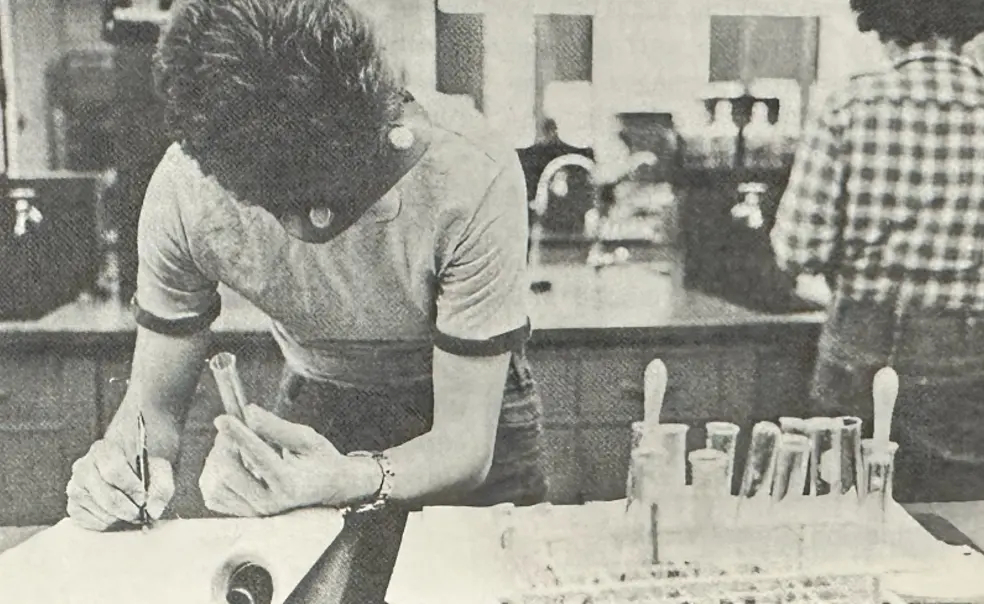On The Campus — Challenging the Honor System
Cheater, they branded him. They tossed him out of school for a year. They humiliated him, caused him deep emotional distress, and destroyed his chance of getting into medical school, he says. And, former pre-med Robert A. Clayton ’82 contends, they were wrong.
In a $500,000 federal lawsuit that could change the face of Princeton’s 87-year-old Honor System, Clayton charges that the student-run Honor Committee acted unjustly when it convicted him of cheating on a March 1979 biology exam. Readmitted this fall as a junior in the Psychology Department, he insists he is innocent of academic fraud.
Clayton’s suit — the first legal challenge in memory to the university’s already embattled Honor System — paints a starkly unflattering portrait of the seven undergraduate leaders who served as his judge and jury. The student body’s ethical standard-bearers, he asserts, were immature, motivated by petty political and personal concerns, and unqualified to exercise their appointed function. Either the committee violated its own constitution, he says, or the whole Honor System is invalid.
If the case comes to trial, it promises to provide the first public examination of the Honor Committee’s inner workings. The university, however, has filed a motion to dismiss the suit, arguing chiefly that the U.S. District Court in Trenton does not have jurisdiction over Princeton’s internal Honor System. As an indication of how seriously Nassau Hall is taking the case, it has hired William J. Brennan III — a prominent trial lawyer and son of the Supreme Court justice — to handle the defense.
Besides striking at the heart of the university’s Honor System, Clayton’s suit comes at a vulnerable time in the history of the Honor Code. Its constitution underwent significant reforms last year (PAW, May 5), after two campus polls suggested that a disturbingly high 17 percent or more of the student body had cheated at least once during their undergraduate careers. While the scope of the code was broadened and the committee was given greater discretion in assessing penalties, the basic form of the system remains the same: students judge their peers and have all-but-final authority to decide the punishments for academic fraud. In Clayton’s case, the committee recommended a one-year suspension. President Bowen, as virtually always, declined to reverse the decision.
The charge against Clayton stemmed from a laboratory exam in Biology 204, a required course for admission to medical school. His lab partner accused him of conferring with another student before handing in his answers. According to others who have taken the course, such cheating is far from uncommon in its lab tests, which ask students to identify unmarked specimens mounted around the room.
In the ensuing proceedings, Clayton charges, the committee “violated crucial procedural and substantive provisions of the Honor Constitution…[and] demonstrated immaturity and inexperience in dealing with the case.” Specifically, he says, it failed to inform him of his rights, give him adequate notice of his hearing, or provide him with competent counsel.
Nassau Hall’s response to the court rebuts the charges point by point. “We think the action of the committee is substantiated by the evidence and the process is within the law,” University Counsel Thomas H. Wright Jr. ’62 said in his only public comment. Barbara L. Barrow ’81, the committee’s current chairman, was even more circumspect. “I’ve been advised not to answer any questions,” she said.
Behind the committee’s alleged sloppiness, Clayton contends, there was an ulterior motive. His suit argues that because of adverse national publicity given the two campus cheating polls, Princeton’s Honor System “had fallen into considerable disrepute” at the time of his hearing. That led to an atmosphere, he says, in which the committee “felt the necessity of reversing the widely reported failure of the Honor System by…finding a conviction regardless of the evidence.”
Clayton also portrays himself as the victim of a personal grudge by then-committee member Christopher Shields ’79. According to the suit, Shields had been the victim of several pranks by the swimming team and held Clayton’s membership on the squad against him. In addition, Clayton accuses Shields of putting pressure on committee member Brian McDonald ’82, also a swimmer, to remove himself from the proceedings. McDonald says he excused himself voluntarily.
With his hopes of following his father into the medical profession now ruined, Clayton is seeking $250,000 in compensatory damages and another $250,000 in punitive damages. Moreover, his suit implicitly asks that the whole Honor Code be radically altered or scrapped entirely: “[I]t is not in the public interest to foster in a university an archaic system of discipline administered by young, inexperienced students, unsupervised by faculty and administrators, that causes damage to the reputations, careers, and mental condition of college-age youth…who have committed no offense.”
--
Barton Gellman ’82, a Wilson School major from Philadelphia, worked as a reporter for the Miami Herald over the summer.
This was originally published in the October 6, 1980 issue of PAW.












No responses yet